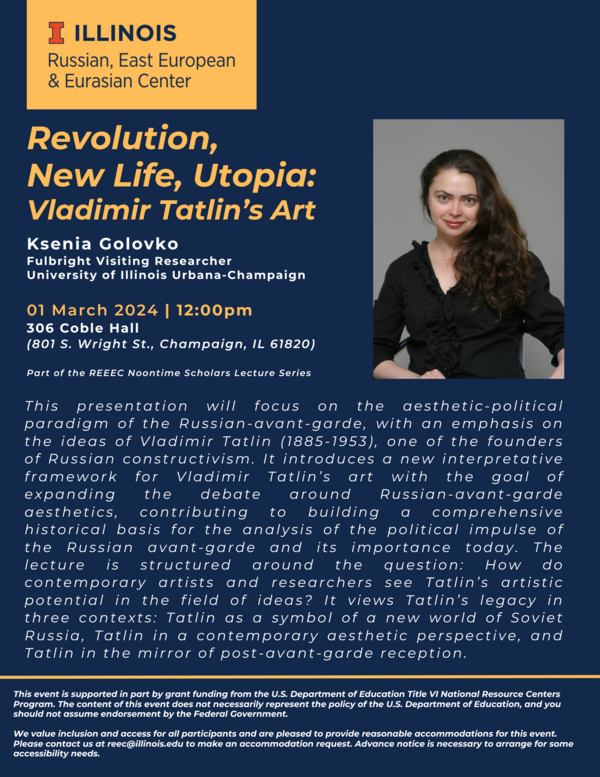REEEC Noontime Scholars Lecture: Ksenia Golovko, "Revolution, New Life, Utopia: Vladimir Tatlin's Art"

- Sponsor
- REEEC
- Speaker
- Ksenia Golovko (Fulbright Visiting Researcher)
- Cost
- Free and open to the public.
- Contact
- REEEC
- reec@illinois.edu
- Views
- 338
This presentation will focus on the aesthetic-political paradigm of the Russian-avant-garde, with an emphasis on the ideas of Vladimir Tatlin (1885-1953), one of the founders of Russian constructivism. It introduces a new interpretative framework for Vladimir Tatlin’s art with the goal of expanding the debate around Russian-avant-garde aesthetics, contributing to building a comprehensive historical basis for the analysis of the political impulse of the Russian avant-garde and its importance today. The lecture is structured around the question: How do contemporary artists and researchers see Tatlin’s artistic potential in the field of ideas? It views Tatlin’s legacy in three contexts: Tatlin as a symbol of a new world of Soviet Russia, Tatlin in a contemporary aesthetic perspective, and Tatlin in the mirror of post-avant-garde reception.
Ksenia Golovko is a scholar specializing in contemporary aesthetics and the history of avant-garde art in Russia and the Soviet Union. She is currently a Fulbright visiting researcher at the University of Illinois Urbana-Champaign in the Art History program at the School of Art and Design. She is developing an anthology that will collect materials related to the legacy of one of the key figures of avant-garde art - Vladimir Tatlin (1885-1953).
The anthology project arises from Ksenia’s PhD thesis, “Revolution, New life, Utopia: Vladimir Tatlin’s Art in Jacques Rancière’s Theoretical Perspective”, which she defended at St. Gallen University, Switzerland in 2018. The dissertation brings together the aesthetic-political paradigms of Tatlin and the contemporary philosopher Ranciere, showing their common concerns with equality, collectivity, and art as an intervention in the distribution of the sensible.
Ksenia is a multidisciplinary researcher. She is the author of several articles on 20th-century culture and aesthetics. She founded the research platform Media Center At the University of St. Petersburg, which hosted seminars on issues in contemporary cultural production, and developed research curricula as a fellow at the CEU in Budapest.